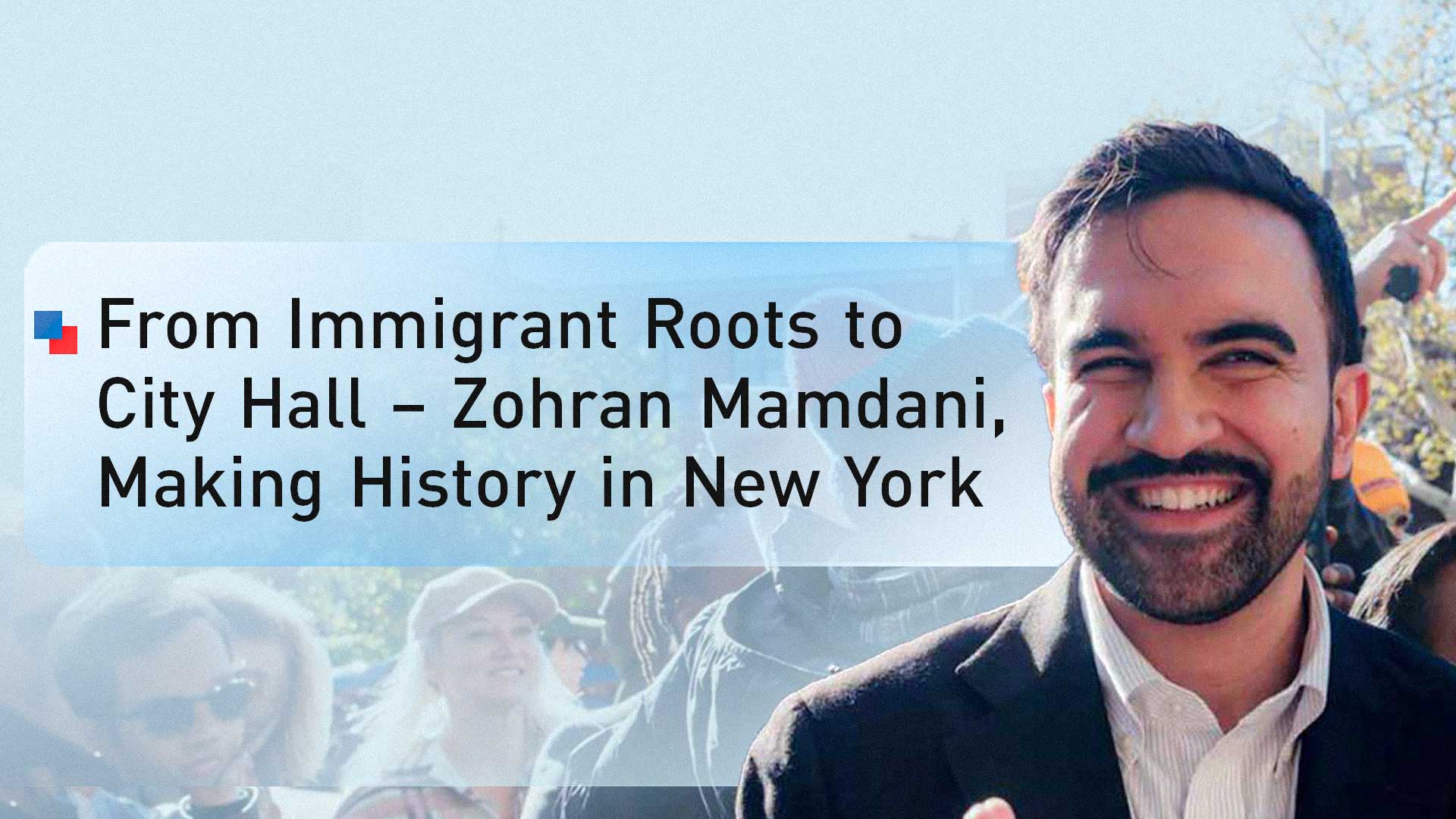New York’s Political Earthquake: Zohran Mamdani Rises to Power, Defying the Establishment
The 34-year-old democratic socialist promises sweeping reforms and vows to stand up to the Trump administration.

ERBIL (Kurdistan24) — In a stunning political upset, Zohran Mamdani, a 34-year-old state lawmaker and outspoken democratic socialist, was elected mayor of New York City on Tuesday, defeating former Gov. Andrew Cuomo and Republican Curtis Sliwa in one of the most contentious and closely watched races in recent U.S. history.
Mamdani’s victory marks a watershed moment for American urban politics. He becomes the city’s first Muslim mayor, the first of South Asian heritage, the first born in Africa, and the youngest to hold the post in more than a century.
His triumph signals a sharp leftward turn for the Democratic Party in America’s largest metropolis — and a bold challenge to President Donald Trump’s administration, which has already clashed with progressive city leaders.
“The conventional wisdom would tell you that I am far from the perfect candidate. I am young, I am Muslim, I am a democratic socialist — and I refuse to apologize for any of this,” Mamdani told a jubilant crowd in Brooklyn.
“New York, tonight you have delivered a mandate for change. I will wake up each morning with one purpose: to make this city better for you than it was the day before.”
More than two million New Yorkers cast ballots in a historic turnout — the highest in over five decades — according to the city’s Board of Elections.
With roughly 90% of votes counted, Mamdani held a commanding nine-point lead over Cuomo, whose attempted political comeback fell short amid lingering controversy and a campaign critics described as bitter and negative.
The victory was cheered by progressives nationwide who view Mamdani’s rise as evidence that left-wing candidates can succeed by directly appealing to working-class voters rather than moderates.
His grassroots campaign focused on affordable living, free childcare and public transit, and redirecting city resources toward social services rather than policing.
At his victory celebration, supporters waved New York City flags and danced to Bad Bunny songs as campaign posters rained down.
“This is a victory for every worker who has ever felt unseen in their own city,” one volunteer said amid the cheers.
In contrast, Cuomo’s concession event in midtown Manhattan was somber. “Almost half of New Yorkers did not vote to support a government agenda that makes promises that cannot be met,” Cuomo said, though he urged his supporters not to boo the victor. “Tonight was their night,” he added.
President Trump, who had repeatedly attacked Mamdani during the campaign, warning that his election would “destroy New York,” reacted online with a cryptic post on Truth Social: “…AND SO IT BEGINS!”
Mamdani, who was born in Uganda and raised in Queens before becoming a U.S. citizen in 2018, addressed Trump directly in his speech: “New York will remain a city of immigrants, built by immigrants, powered by immigrants — and as of tonight, led by an immigrant. If anyone can show a nation betrayed by Donald Trump how to defeat him, it is the city that gave rise to him.”
Mamdani’s incoming administration faces enormous challenges. His campaign promises — which include free bus service, city-run grocery stores, and a Department of Community Safety to send mental health professionals instead of police on some emergency calls — have been hailed by supporters as visionary and dismissed by critics as unrealistic.
With Democratic Governor Kathy Hochul opposing any tax hikes on the wealthy, Mamdani will have to find new funding sources for his social agenda. His stance toward the New York Police Department will also be closely watched.
Once an outspoken advocate of defunding the NYPD, Mamdani has since softened his tone, pledging to work with the existing commissioner to “rebuild trust between communities and those sworn to protect them.”
He will also have to navigate fraught national and international politics. A longtime critic of Israel’s military actions in Gaza, Mamdani has accused Israel of committing genocide and said he would honor an International Criminal Court warrant for Prime Minister Benjamin Netanyahu — a position that drew condemnation from both Cuomo and Sliwa during the campaign.
Mamdani’s ascent from a little-known state legislator to mayor of America’s largest city has been meteoric. Entering the race as an underdog, he overcame the powerful Cuomo political machine through charismatic social media outreach, community soccer tournaments, and a message of solidarity with working-class New Yorkers.
Cuomo, still burdened by the sexual harassment allegations that forced his 2021 resignation and his controversial handling of the COVID-19 pandemic, struggled to connect with younger voters and progressives.
His attempt to rebrand himself as an independent voice fell flat as Mamdani’s populist optimism gained momentum.
Sliwa, the Republican founder of the Guardian Angels, provided color to the campaign but little challenge in a heavily Democratic city. He conceded early on election night, offering Mamdani “good luck, because if he does well, we do well,” but warned that conservatives would “become the mayor-elect’s worst enemies” if he tried to “render our police weak and impotent.”
Zohran Mamdani’s election marks a generational and ideological shift in New York politics — one that will test the limits of progressive governance in a city long divided by inequality. His promises of radical reform have stirred both hope and anxiety in equal measure.
Whether he can transform those ideals into tangible progress will determine not only the future of New York but also the trajectory of the Democratic Party itself.
As Mamdani told his cheering supporters late Tuesday night, “The skeptics said this city could never be governed by someone like me. But this city has always been built by dreamers. Tonight, the dreamers won.”